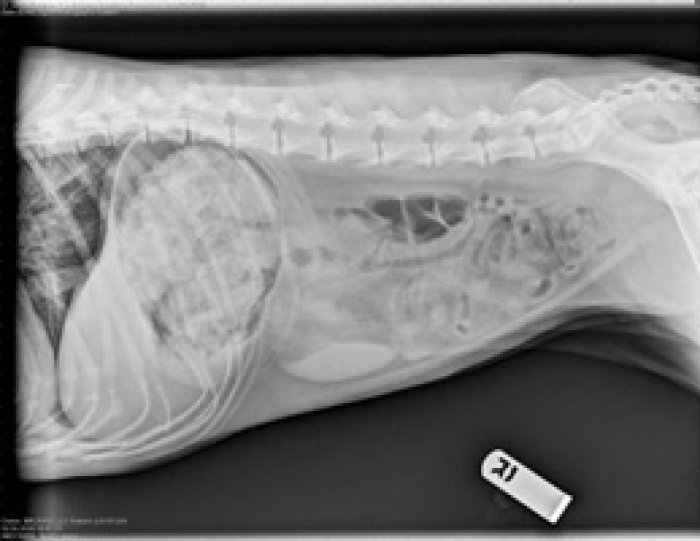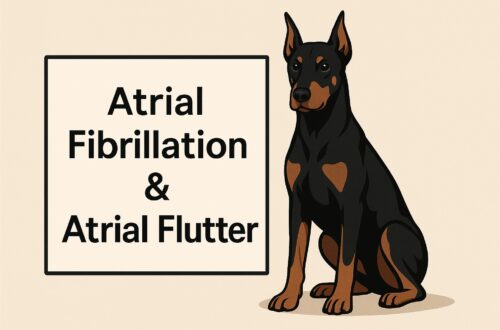Diarrhea or should I say chronic diarrhea is one of the more common reasons dogs and cats are referred to board-certified veterinary internal medicine specialists. By definition chronic diarrhea has been present for more than three weeks. Certainly the majority of pet parents are profoundly frustrated by the time they are referred or heed their family veterinarian’s recommendation to have their pet evaluated by a board-certified internal medicine specialist.
There is no such thing as just diarrhea…
The intestinal tract of dogs and cats is relatively quite long, and is divided into two major sections: the small intestine/bowel and the large intestine (also commonly called the colon). This is an important fact because chronic diarrhea may arise from either one of these segments or even from both of them. Thus it is more appropriate (and quite helpful) to describe chronic diarrhea as small bowel, large bowel or mixed bowel in nature.
Small, large and mixed bowel…Oh My!
How does one differentiate small bowel diarrhea from large bowel diarrhea? When you bring your pet to a board-certified internal medicine specialist for chronic diarrhea, you will rapidly learn we ask a lot of question about feces. It’s not that we necessarily really like “poop talk” but your answers to our questions are of vital importance. The causes of small bowel chronic diarrhea are different from those that cause large bowel chronic diarrhea. So what are some of the questions you can expect to be asked by a board-certified internal medicine specialist?
- Does your pet posture normally to defecate?
- Does your pet seem to strain to defecate or seem to be in pain whilst defecating?
- What color are your pet’s feces? Are they or have they ever been black like tar or look like raspberry jelly?
- Compared to one of your pet’s normal bowel movements, is your pet’s chronic diarrhea the same volume, larger volume or smaller volume?
- Does your pet need to defecate more frequently?
- Does your pet’s feces contain mucus (jelly-like substance)?
- Is your pet’s chronic diarrhea more fetid (stinkier) than normal?
- Is your pet losing weight?
- Does your pet’s intestinal tract make more noises than usual?
As weird as this may sound, bringing pictures of your pet’s bowel movements to your pet’s consultation with a board-certified internal medicine specialist can actually be quite helpful. Even a video of your pet defecating can be invaluable. Accurate answers to the above questions, as well as pictures (and videos), can provide a wealth of information to help us develop the most logical and cost-effective diagnostic and treatment plan for your fur baby.
Signs consistent with small intestinal chronic diarrhea include:
- Normal posturing to defecate without pain or straining
- Feces are often very watery in consistency – parents often describe their pet’s defecation like the spraying of a hose
- Feces do not have fresh blood (raspberry jam) or mucus in them
- The volume of diarrhea is at least normal and often larger than normal
- Frequency of defecation is normal
- Weight loss and increased intestinal sounds are present
Signs consistent with large intestinal diarrhea include:
- Straining to defecate
- Increased frequency of defecation
- Feces often contain fresh blood and/or mucus
- Weight loss is not a common finding
- Fecal volume is commonly smaller than usual
It’s not necessarily the gut’s fault…
There are many primary intestinal diseases that can cause a pet to develop small bowel, large bowel or mixed bowel chronic diarrhea. Notable common examples include:
- Inflammatory bowel disease
- Intestinal cancer (i.e.: lymphoma, adenocarcinoma)
- Intestinal parasites
- Lymphangiectasia (disorder of the lymphatic vessels in the intestinal tract)
- Ulcers
- Food hypersensitivity
- Certain infectious diseases (bacteria, viruses, protozoa)
- Certain drugs
But chronic diarrhea does not necessarily result from a primary problem of the intestinal tract. That is to say,
it’s not always the gut’s fault!
Diseases outside of the intestinal tract can secondarily affect one part or all of it, subsequently causing a form of chronic diarrhea. Some of the secondary culprits are:
- Exocrine pancreatic insufficiency (a disorder whereby the pancreas doesn’t secrete enough digestive enzymes)
- Pancreatitis (inflammation of the pancreas)
- Hypoadrenocorticism (Addison’s disease, a disorder characterized by a dysfunction of the adrenal glands)
- Liver disease
- Gallbladder disease
- Certain infectious diseases (bacteria, viruses, protozoa)
- Certain drugs
Making the diagnosis…
Your family veterinarian may simply initially recommend an anti-diarrhea medication like metronidazole (Flagyl®) to help control your pet’s chronic diarrhea. And this isn’t necessarily the wrong thing to do. But it is important to recognize the prescription of a medication for a pet’s diarrhea doesn’t provide a definitive diagnosis; rather it is symptomatic care – a Band-Aid® if you will. So if your pet’s chronic diarrhea doesn’t respond to an initial prescription or if it returns as soon as the medication is discontinued, further investigation is absolutely warranted and recommended.
I believe it is always in a pet’s best interest to learn the definitive cause of his/her chronic diarrhea. Understandably some diagnostic tests are needed, and these range from non-invasive blood, urine and fecal tests to diagnostic imaging studies like abdominal radiographs (x-rays) and ultrasonography.

Ultimately intestinal biopsies may be required to obtain a definitive diagnosis.
The take-away message…
Chronic diarrhea in dogs and cats can be a frustrating problem, as it has many potential causes. Definitively determining the cause of chronic diarrhea is profoundly important to help ensure a pet is able to return to the highest possible quality of life for as long as possible. Consulting with a board-certified veterinary internal medicine specialist as early as possible in the course of a pet’s illness can help a family and the primary care veterinarian develop the most logical and cost-effective plan to address and resolve a pet’s chronic diarrhea.
To find a board-certified veterinary internal medicine specialist, please visit the American College of Veterinary Internal Medicine.
Wishing you wet-nosed kisses,
cgb




